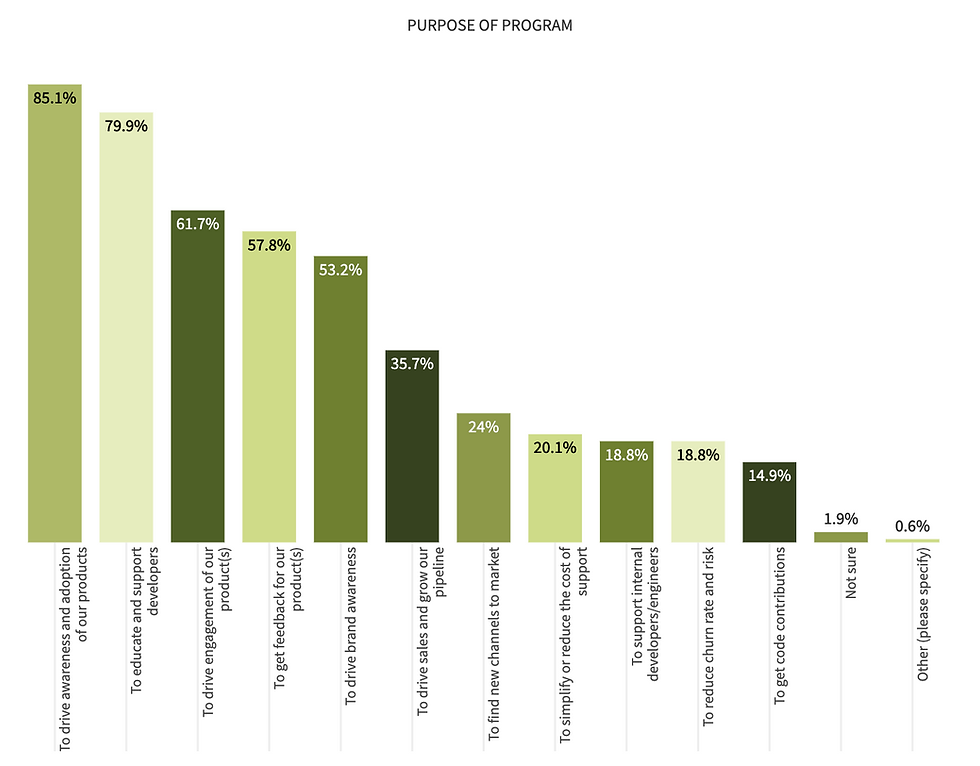Survey Insights: Education-First DevRel
- DevRel.Agency

- Feb 1, 2024
- 4 min read
Updated: Feb 7, 2024

Developer Education (DevEd) is a critical pillar of Developer Relations (DevRel), as the success of a DevRel program hinges on understanding and addressing the needs of developers. This blog delves into crucial insights derived from the State of Developer Relations Report 2023, Chapters 15 and 19 of "How to Build and Grow a Successful Developer Program" by DevRel.Agency co-founders Caroline Lewko and James Parton.
DevEd includes technical information beyond the Docs (Documentation), as well as tutorials, webinars, in-depth training courses, and other learning resources. These materials are essential to help developers through their journey as they Discover, Evaluate, Learn, and Build with your product.
The Growing Significance of Developer Education When we created the Developer Relations Framework (shown in Figure 1), we appreciated that Developer Education was a very important and growing DevRel activity. This was subsequently confirmed by respondents to the 2023 State of Developer Relations Report.

Figure 2 presents the response to question 36 of the survey, which focuses on the primary challenges for developer programs. The data highlights a key obstacle in DevRel: the ongoing creation of technical content, constituting the top challenge at 44.8%. This emphasizes the need for skilled practitioners who can consistently deliver up-to-date developer-focused learning resources.
The "Learn" Stage of The Developer Journey
As developers progress through their journey of discovering, evaluating, learning, and building with a product, the Learn stage is pivotal. To learn more about our Developer Journey, download the whitepaper.
Engage developers, build their confidence, and ensure they can create with your product efficiently
But what does learning look like for developers? In a nutshell, developers learn by doing. This means that how-to materials like guides, tutorials, and technical case studies play a key role in helping developers get started. These should be backed by other learning resources like technical blogs, webinars, live coding events, training, and certification programs. Implementing these in practice, however, can be complex and expensive.
Learning resources must cater to a range of knowledge levels spanning beginners new to a product’s domain to experts, as well as diverse learning styles and support for neurodiversity. It’s best to find the “lowest common denominator” across your developer audience and build up from there.
Treat developers as unique personas with distinct needs. Tailoring education based on your segmentation ensures that the content resonates with the preferences of those developers.
Ensure your content is inclusive - create for your lowest common denominator and build up from there
According to Question 35 of the report, the leading purpose of a developer program is driving product awareness and adoption (85% of respondents), with continued education and support of developers in second place (80% of respondents), as depicted in Figure 3 below.
Respondents were asked which activities they believe are part of DevRel, as seen in Figure 4. Survey respondents recognize DevEd as a crucial core activity, ranking it 4th, behind only Community building, Advocacy, and Developer Experience.
Going Beyond Documentation: Education Resources
Beyond basic documentation, a robust DevRel program offers an array of resources to enrich the learning experience.
1. Forums and Community Messaging Tools
These platforms play a pivotal role in the learning journey, with developers seeking answers to specific issues while forums showcase the level of engagement within the community. We recommend involving Developer Education (DevEd) experts in creating a vibrant forum space. This space should enable developers to share insights, troubleshoot problems, and collaboratively explore new ideas. The ease of searching for topics instills confidence in the active support and usability of the product. This enhances the developer experience (DX) and fosters a sense of community among users.
2. Learning Resources
Learning resources extend beyond conventional documentation to include ebooks, blogs, tutorials, podcasts, demos, and projects. Many DevRel programs feature a dedicated learning resources section, offering diverse content. We recommend creating in-depth tutorials that guide developers through real-world scenarios. Ensuring these resources are easily searchable and marked with relevant details is crucial to satisfying developers' appetite for learning materials.
3. Office Hours
Office hours provide a direct avenue for developers to connect with the DevRel team, creating a sense of availability. Regularly scheduled office hours signal to developers that support is readily accessible when needed. This direct interaction can foster community and make developers feel heard and supported.
4. Training Programs
Structured training programs offer a methodical approach to learning, complementing self-directed learning. These programs may include coding sessions, tutor-led courses, and certification programs. Industry leaders like Microsoft exemplify the value of certification programs, adding substantial value to developers' professional development. We suggest incorporating a variety of training methods to cater to diverse learning preferences, ensuring developers can choose the format that suits them best.
In short, a comprehensive DevRel education strategy incorporates a multifaceted approach that facilitates knowledge transfer and cultivates a thriving developer community.
Key Takeaways
As your DevRel practice evolves, commitment to educating developers is a cornerstone of success. By understanding the nuances of the "Learn" stage, DevRel leaders can create a thriving ecosystem that educates, nurtures, and drives developer success.
Here are key takeaways from the State of Developer Relations Report 2023:
Prioritize Developer Education for sustained DevRel success.
Focus on the Learn stage and personalize content for diverse knowledge levels and learning styles.
Hire specialized educators and writers.
Enrich DevEd with forums, resources, office hours, and training.
Conduct a DEFT Developer Experience Audit to gain actionable insights and uncover friction points in your developer journey.
Spotlight on Our Sponsor: Orbit
Orbit, the leading community growth platform, aligns with the theme of education-first DevRel by providing a robust solution for community building. Unlocking insights, ambassadors, referrals, leads, and vibes, Orbit's unique approach, based on the Orbit Model, empowers organizations to measure and grow thriving communities. Focusing on community-driven growth, Orbit complements the education-first strategies advocated in the State of Developer Relations insights.






